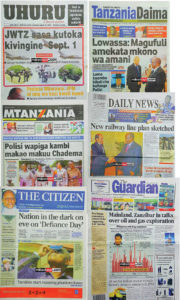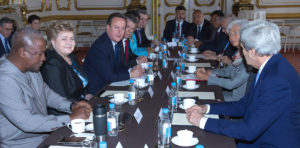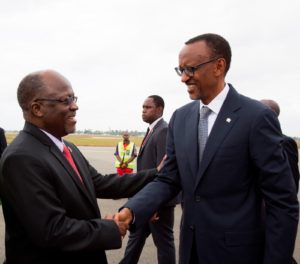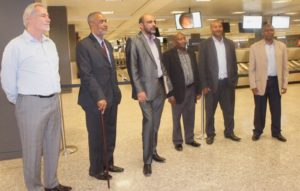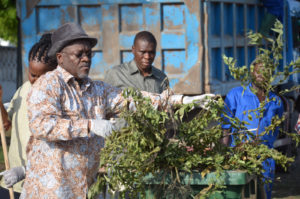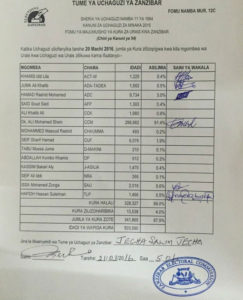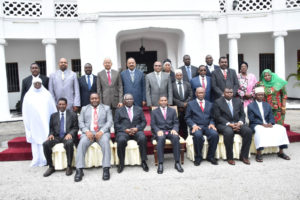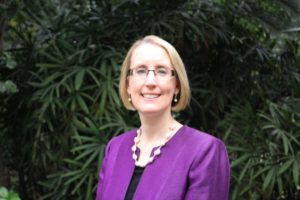by Ben Taylor
Since coming to office, the pace of President Magufuli’s activity has surprised many observers. In government, the phrase – HapaKaziTu! (Work and nothing else!) – rapidly evolved from a campaign slogan into a philosophy for governance. Whether it comes to economic policy and taxation, public services and public administration, corruption or the media, business as usual is no more.
The president’s early actions against corruption, tax avoidance and waste drew praise and popularity from many quarters. With the Prime Minister, Kassim Majaliwa, he led concerted efforts to clamp down on corruption and raise revenues at Dar es Salaam port, and with the Minister of Education, Prof Joyce Ndalichako, to stop abuse of the higher education and student loans systems. Tight restrictions on foreign travel for public officials and on the use of hotels and conference centres for government meetings were introduced, and the President took a high-profile decision to replace expensive public celebrations of Independence Day in December 2015 with a national exercise to cleanup public spaces. Campaign promises to put an end to school fees and to reduce the basic rate of tax were acted upon. And over 300 public officials have been fired, suspended or reassigned, under the slogan of “tumbua majipu” – “piercing the boils”. Those who have been lost their positions include the heads of the Tanzania Investment Centre (TIC), Tanzania Communications Regulatory Authority (TCRA), the Prevention and Combatting of Corruption Bureau (PCCB), Tanzania Revenue Authority (TRA), Dar es Salaam City Council, and the Chief Secretary (the country’s most senior civil servant). (For further details, see previous issues of TA). This is coupled with a campaign to root out so-called “ghost workers” – civil servants on the government payroll but who do not in reality exist. Over 16,000 “ghost workers” have reportedly been removed from the payroll.
“What would Magufuli do?” asked Twitter users around the world, celebrating the new president’s parsimonious approach to public spending, and comparing him very favourably with other heads of state. Forbes Africa magazine named him on their shortlist of five for Person of the Year (though he eventually lost out to South Africa’s Public Protector, Thuli Madonsela).
More recently, the president has announced that the long-standing intention to shift the site of government from Dar es Salaam to Dodoma would now be fast-tracked. The initial decision was made by President Julius Nyerere in 1973, but had thus far translated into little beyond the relocation of parliament twenty years ago. President Magufuli announced the move would happen before the end of his first five-year term, and Prime Minister Majaliwa swiftly followed this up with a tighter timetable: that he would move by September, to be followed soon after by all other ministers.
Further, he has purchased three new aircraft for the struggling national airline, Air Tanzania, and suspended the import of sugar and coal in an effort to support local producers.
An opinion poll survey published by Twaweza in September 2016 found the president had the approval of 96% of Tanzanian citizens on the mainland, higher than any approval rating for any African head of state ever reported by Afrobarometer, an Africa-wide opinion polling initiative. The same survey found high levels of support for the president’s actions against corrupt public officials, against ghost workers, and for the removal of school fees. The president has positioned himself as being on the side of the ordinary citizen, taking on big business, corruption and waste, and his actions and slogans have captured the public imagination.
At the same time, however, other aspects of President Magufuli’s style of leadership have increasingly drawn criticism – most particularly his attitudes to business, to the civil service, and to democracy.
Investors in the tourist industry have complained that removal of VAT exemptions for many tourism-related goods and services will have a negative impact on their businesses and on the economy as a whole. Importers have argued that heavy-handed enforcement of tax regulations – including moves to charge import duties on goods in transit – will lead to a drop in revenues as transporters take their business away from Dar es Salaam to ports in Kenya, Mozambique or South Africa. Debates about whether or not tourist numbers, hotel bookings, port and transit volumes and tax revenues have declined continue to rage.
A disagreement over Tanzania’s largest cement factory – see also the economics and business section in this issue – is illustrative of these complaints. Ahmed Salim, an analyst at Teneo Intelligence, told Quartz, an online magazine, that the situation “paints an unfavourable and unpredictable outlook for investors looking at the Tanzanian market.” Coupled with a perception that businesses are being subjected to sudden changes in tax policy, investors are reportedly concerned.
Other observers are concerned that the new HapaKaziTu! culture in the civil service has spilled over into a climate of fear. Coupled with tight controls on expenditure and increased scrutiny of their past and present actions – see also the education section in this issue – this has left many civil servants reportedly feeling untrusted and undervalued, and afraid to make decisions.
The Shadow Minister for Public Service Management and Good Governance, Ruth Mollel, herself a former Permanent Secretary, warned the government that its disregard of the rule of law would backfire. “This country cannot be governed through personal opinions and decisions while there are laws set to be adhered to,” she said. “We have been witnessing cases of civil servants being fired and demoted without being given the opportunity to be heard, and this has created fear and demoralised the majority of the workers.” Trade Unions, including the Tanzania Teachers Union and the Trade Union Congress of Tanzania (TUCTA), have also questioned the apparent lack of adherence to proper disciplinary procedures.
Finally, a third set of complaints relate to democracy and human rights. In December, Maxence Melo, one of the founders and owners of Jamii Forums, a popular online discussion forum, was arrested. He was later charged with two counts of obstructing police investigations under the Cybercrimes Act – for refusing to reveal the names of whistle-blowers using the site – and one count of operating a website that does not use the “dot-tz” top level domain.
This was the latest in a series of moves that leave the media, opposition politicians and human rights’ activists feeling vulnerable. A number of journalists and politicians have been arrested and/or charged with sedition. Live TV and radio broadcasts of proceedings in parliament – previously very popular – have been stopped. The Legal and Human Rights Centre (LHRC) has raised the question of whether public officials dismissed for wrongdoing were given a fair opportunity to defend themselves. Since the 2015 elections, several arrests have been made under the Cybercrime Act for insulting the president on social media.
In June, the President announced a ban on political rallies, on the grounds that the elections were over and the government and the public needed to stay focussed on delivering development. The ban was later extended to cover indoor party meetings. Leaders of the opposition parties, Chadema and ACT-Wazalendo, denounced the move as unconstitutional, and Chadema planned a nationwide “day of defiance” on September 1st, under the banner Umoja wa Kipinga Udikteta Tanzania (UKUTA) – Alliance Against Dictatorship in Tanzania. The police announced that the protests did not have permission, and for a few days in late August the rhetoric on both sides grew increasingly aggressive. Tensions were raised further by the murder of four police officers in a probably unconnected incident in the outskirts of Dar es Salaam. “If anyone complains about human rights, send them to me,” said the Dar es Salaam Regional Commissioner, Paul Makonda, while directing the police to show no mercy in response. A confrontation was avoided when Chadema postponed the planned demonstrations.
More recently, the enactment in November of the Media Services Act has attracted criticisms that the government is clamping down on freedom of the press. Among other controversial provisions, the bill introduces a requirement for all media to publish or broadcast news “as the government may direct,” along with a system of government-controlled accreditation for individual journalists. The opposition argued in parliament that this enables the government to screen journalists so that only those who report favourably are allowed to continue.
“This bill is a clear and present danger to the independence of Tanzania’s media, to our collective struggle against corruption and to our young democracy,” wrote Aidan Eyakuze, Executive Director of Twaweza. “Passing it without fundamental changes will cast a long shadow over all the good that President Magufuli’s anti-corruption efforts have achieved.”
President Magufuli has shaken up Tanzania in his first year in office. His supporters would argue that taking on such ingrained problems cannot be done without upsetting some people, and that his opponents are determined to oppose him whatever he does. His critics point to a growing list of concerns.
President Magufuli is set to remain in office until at least 2020. Maintaining this level of activity for that length of time will not be easy. He has already shown, however, that he is up for a challenge.

